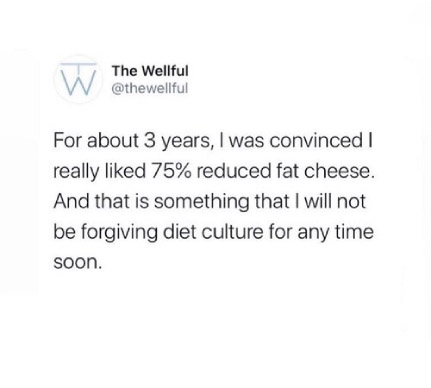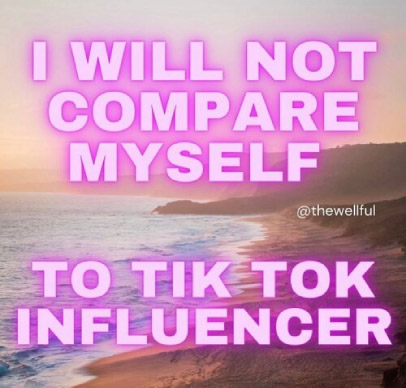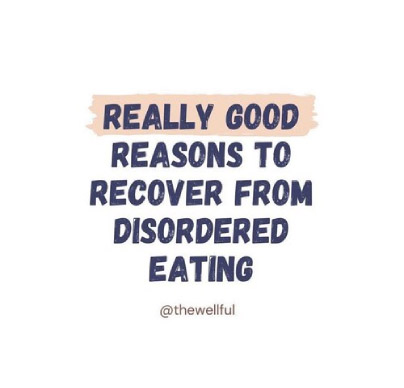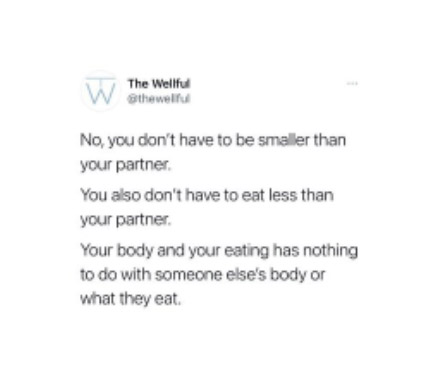Building a better relationship with food is an inside job; by that, we mean it starts from the inside out, by reframing your mindset. Food is not the enemy, but rather a source of energy, nourishment, and enjoyment. Still, developing a good relationship with food isn’t always a straightforward path. Knowing what needs to be done is different from knowing how to do it. That’s where our registered dietitian, Brenna, comes in.
Your relationship with food is influenced by so many factors, including your personal history, your family, your experiences with food, and so much more. It can be hard to combat stories society once told you were true, especially when it comes to food and body. If you’re looking for a way out of food obsession and want to break free from diet culture, you’ve come to the right place. Consider implementing these strategies and you may just see an improvement in your relationship with food…and perhaps your entire life.
Tip 1: Swap Tracking for Trusting
A lot of people use food apps and/or fitness trackers to maintain a sense of control around what they’re eating, exercise, and their bodies in general. While this may feel neutral for some, it could also lead to an obsession with calorie counting, step tracking, and way too much energy spent focusing on numbers. If you’re currently tracking what you eat in a food app, instead try
- Deleting the app for 1 day
- Deleting the app for 1 week
- Evaluating your relationship with tracking in general.
Ask yourself what you like about the app or tracker and be honest. Then get inquisitive about what you don’t like about it. What comes up for you? The same practice can be done for a scale. If you’re in the habit of weighing yourself on a regular basis but find that every time you do it, it sends you into a bad mental state, start questioning how valuable it really is. You don’t have to change everything all at once. Just get curious.
Tip 2: Trade Critiques for Curiosity
On the note of curiosity, start asking more questions. It may feel like second nature to critique your body every time you get dressed, get out of the shower, see a photo of yourself, receive a compliment… you fill in the blank. What if you didn’t do that?
Instead of instantly defaulting to self-criticism, start analyzing where that gut reaction comes from. This form of cognitive behavioral therapy (CBT) as a way to increase awareness and change habits and patterns. It requires a two-pronged approach:
- Build awareness: “I body check most when I’m ____.”
- Interrupt the cycle: “The next time I ____, I’m going to
- state a neutral observation.”
- do something comforting.”
- modify my routine to minimize triggers (i.e., wear clothes I know fit, reduce my time in front of the mirror, take a break from social media, etc.).”
Tip 3: Consider Yourself as Part of “Everyone Else”
Some people with disordered eating find that they have different rules and expectations for how other people can/should eat vs. how they themselves can/should eat. For example, if you find yourself thinking, “That’s fine for everyone else but I could never eat that,” this might be something to explore. In the grand scheme of things, you are part of “everyone else.” That’s not to say that you’re not special; you are! But the same “rules” or lack thereof that apply to everyone else also hold true for you.
To challenge this “me vs. everyone else” narrative, ask yourself why you have such different rules or expectations for yourself vs. others. After all, all bodies need enough food every day. In that sense, you really are not different from the rest. Questioning your long-held beliefs surrounding food rules or restrictions that you’ve set for yourself could help you improve your relationship with food.
Tip 4: Turn to a Professional
If you think your relationship with food could use some work, it may be helpful to look to a professional for some expert guidance. Registered dietitians like me can help you reevaluate your relationship with food and body image. Our work together could make it so that intrusive, unhelpful thoughts take up less brain space and energy in your day.
You deserve to feel more at peace with food and your body. Having more flexibility around food will open your life up in a way that allows you to focus on other, more important things. Food doesn’t have to run the show. Working with a registered dietitian could be the way out.
Rebuilding Your Relationship with Food and Body
Here at The Wellful, we provide compassionate nutrition therapy to help you heal your relationship with food and your body. In this judgment-free zone, you will find community, education, and support to live freely without obsession or restriction around eating.
Being human is hard! But you do not have to go it alone. Join our compassionate community and get personalized support to help you make peace with food and body. Give us a call at 925-725-2761 or schedule a free 15-minute consultation with Brenna, RD to start your journey.











